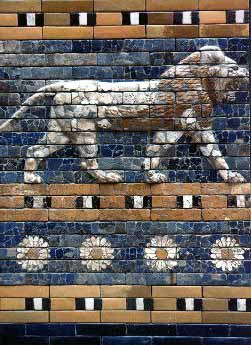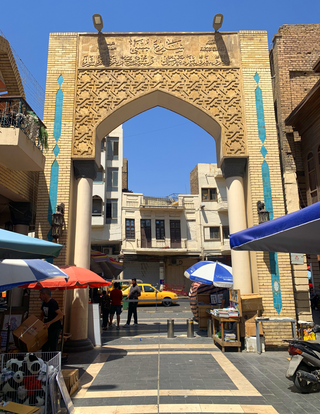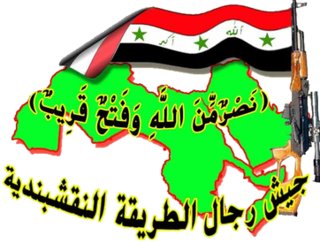Related Research Articles

Baghdad is the capital of Iraq and the second-largest city in the Arab world after Cairo. It is located on the Tigris river. In 762 CE, Baghdad was chosen as the capital of the Abbasid Caliphate, and became its most notable major development project. Within a short time, the city evolved into a significant cultural, commercial, and intellectual center of the Muslim world. This, in addition to housing several key academic institutions, including the House of Wisdom, as well as a multiethnic and multi-religious environment, garnered it a worldwide reputation as the "Center of Learning".

The Culture of Iraq or The Culture of Mesopotamia is one of the world's oldest cultural histories and is considered one of the most influential cultures in the world. The region between the Tigris and Euphrates rivers, historically known as Mesopotamia, is often referred to as the Cradle of civilisation. Mesopotamian legacy went on to influence and shape the civilizations of the Old World in different ways such as inventing writing system, mathematics, law, astrology and many more. Iraq is home to diverse ethnic groups who have contributed to the wide spectrum of the Iraqi Culture. The country is known for its poets، architects، painters and sculptors who are among the best in the region, some of them being world-class. The country has one of the longest written traditions in the world including architecture, literature, music, dance, painting, weaving, pottery, calligraphy, stonemasonry and metalworking.
Aziz Saleh al-Numan al-Khafaji is a former Iraqi Ba'ath Party Regional Command Chairman. He was appointed Iraqi governor of Kuwait by Saddam Hussein during the 1991 Gulf War; taking over the post from Ali Hassan al-Majid in November 1990, and holding it until 27 February 1991. He previously served as Governor of Karbala (1976-1979), Governor of Najaf (1979-1986) and Minister of Agriculture (1986-1991).

Salam Pax is the pseudonym of Salam Abdulmunem, aka Salam al-Janabi, under which he became the "most famous blogger in the world" during and after the 2003 invasion of Iraq. Along with a massive readership, his site "Where is Raed?" received notable media attention. The pseudonym consists of the word for "peace" in Arabic (salām) and in Latin (pax). His was one of the first instances of an individual's blog having a wide audience and impact.

The Green Zone is the most common name for the International Zone of Baghdad. It was a 10-square-kilometer (3.9 sq mi) area in the Karkh district of central Baghdad, Iraq, that was the governmental center of the Coalition Provisional Authority during the occupation of Iraq after the American-led 2003 invasion and remains the center of the international presence in the city. Its official name beginning under the Iraqi Interim Government was the International Zone, though Green Zone remains the most commonly used term. The contrasting Red Zone refers to parts of Baghdad immediately outside the perimeter, but was also loosely applied to all unsecured areas outside the off-site military posts. Both terms originated as military designations.

The Council of Representatives, usually referred to simply as the Parliament, is the unicameral legislature of the Republic of Iraq. According to the Constitution of Iraq, it is the lower house of the bicameral legislature of the country. As of 2020, it comprises 329 seats and meets in Baghdad inside the Green Zone.

Al-Firdos Square is a public open space in central Baghdad, Iraq. It is named after the Arabic word Firdaws, which means "paradise". The site has been the location of several monumental artworks.

Khairallah Talfah, also known as Khayr-Allah Telfah, Kairallah Tolfah, Khairallah Tolfah, or Khairallah Tilfah, was an Iraqi Ba'ath Party official, and the maternal uncle and father-in-law of Saddam Hussein. He was the father of Sajida Talfah, Saddam's first wife, and of Adnan Khairallah, defence minister. Saddam appointed Khairallah Talfah mayor of Baghdad, but he was forced to remove Khairallah from office due to corruption.

Governorate council elections were held in Iraq on 30 January 2005, the same day as the elections for the transitional Iraqi National Assembly. Each province has a 41-member council, except for Baghdad, whose council has 51 members.
The cinema of Iraq went through a downturn under Saddam Hussein's regime. The development of film and film-going in Iraq reflects the drastic historical shifts that Iraq has experienced in the 20th century. The Iraq War which began in 2003 had an influence on many films being produced.

Al-Mutanabbi Street is located in Baghdad, Iraq, near the old quarter of Baghdad; at al-Rasheed Street. The street is the historic center of Baghdad bookselling, a street filled with bookstores and outdoor book stalls. The street was named after the 10th-century classical Iraqi poet al‑Mutanabbi and it is well established for bookselling and has often been referred to as the heart and soul of the Baghdad literacy, and intellectual community.

Al-Rasheed Street or Al-Rashid Street is one of the main streets in downtown Baghdad, Iraq. Named after Abbasid Caliph Harun al-Rashid, it is one of the most significant landmarks of the city due to its political, urban, cultural, and artistic history. Located near al-Maidan Square, the Street is considered an important urban heritage site of Baghdad and bears witness to what Iraq has gone through in terms of political events, security unrest, and popular protests that Iraq saw over the course of more than a century. The street includes many ancient landmarks such as Haydar-Khana Mosque. In recent years, the street started to suffer severely from neglect and destruction but efforts and campaigns to rehabilitate the street were outlined.

Oday Rasheed is an Arab-American film director, screenwriter and producer born and raised in Baghdad, Iraq. Rasheed immigrated to New York City in 2012. He has been living and working in Los Angeles since 2022.
Underexposure is a 2005 Iraqi film, in the docufiction style, written and directed by Oday Rasheed, produced by Enlil Film and Arts. The story follows a fictional Iraqi film crew, inspired by the actual crew, that struggles with making a film during the 2003 invasion of Iraq and subsequent American occupation. It was the first feature film to be shot in Iraq after the beginning of the Iraq War.

The Iraq War started with a US-led invasion on 20 March 2003, causing much damage to the capital city, Baghdad. The war and collateral damage continued for years.

The Army of the Men of the Naqshbandi Order, also called the Naqshbandi Army, is one of a number of underground Ba'athist and Sufi militant insurgency groups fighting U.S.-led Coalition forces in Iraq. Media frequently refers to the group by the initials JRTN, a romanization of its Arabic name. Supreme Command for Jihad and Liberation, technically the name of the umbrella organisation to which JRTN belongs, is also often used to refer to JRTN specifically.

Mohammad Ghani Hikmat was an Iraqi sculptor and artist credited with creating some of Baghdad's highest-profile sculptures and monuments and was known as the "sheik of sculptors". He is also known as an early member of Iraq's first 20th-century art groups, including Al-Ruwad and The Baghdad Modern Art Group; two groups that helped to bridge the gap between tradition and modern art. He was also instrumental in recovering many of Iraq's missing artworks, which were looted following the 2003 invasion.

Nasiriyah is a city in Iraq. It is on the lower Euphrates, about 360 km south-southeast of Baghdad, near the ruins of the ancient city of Ur. It is the capital of the Dhi Qar Governorate. Its population in 2003 was about 560,000, making it the fourth-largest city in Iraq. It had a diverse population of Muslims, Mandaeans and Jews in the early 20th century; today its inhabitants are predominantly Shia muslims.
Nida Kadhim is an Iraqi sculptor, noted for producing a number of monumental works for Baghdad's city centre, some of which are still standing, while others were demolished or looted following the 2003 Iraqi invasion.

A series of demonstrations, marches, sit-ins and civil disobedience took place in Iraq from 2019 until 2021. It started on 1 October 2019, a date which was set by civil activists on social media, spreading mainly over the central and southern provinces of Iraq, to protest corruption, high unemployment, political sectarianism, inefficient public services and foreign interventionism. Protests spread quickly, coordinated over social media, to other provinces in Iraq. As the intensity of the demonstrations peaked in late October, protesters’ anger focused not only on the desire for a complete overhaul of the Iraqi government but also on driving out Iranian influence, including Iranian-aligned Shia militias. The government, with the help of Iranian-backed militias responded brutally, using live bullets, marksmen, hot water, hot pepper gas and tear gas against protesters, leading to many deaths and injuries.
References
- ↑ "An avant-garde phoenix rises out of Baghdad's ashes - Salon.com". Archived from the original on 2011-06-06. Retrieved 2007-04-02.
- ↑ http://news.nationalgeographic.com/news/2003/06/0609_030609_tvbaghdadart.html [ dead link ]
- ↑ "Out of the shadows - Salon.com". Archived from the original on 2007-09-29. Retrieved 2007-04-02.